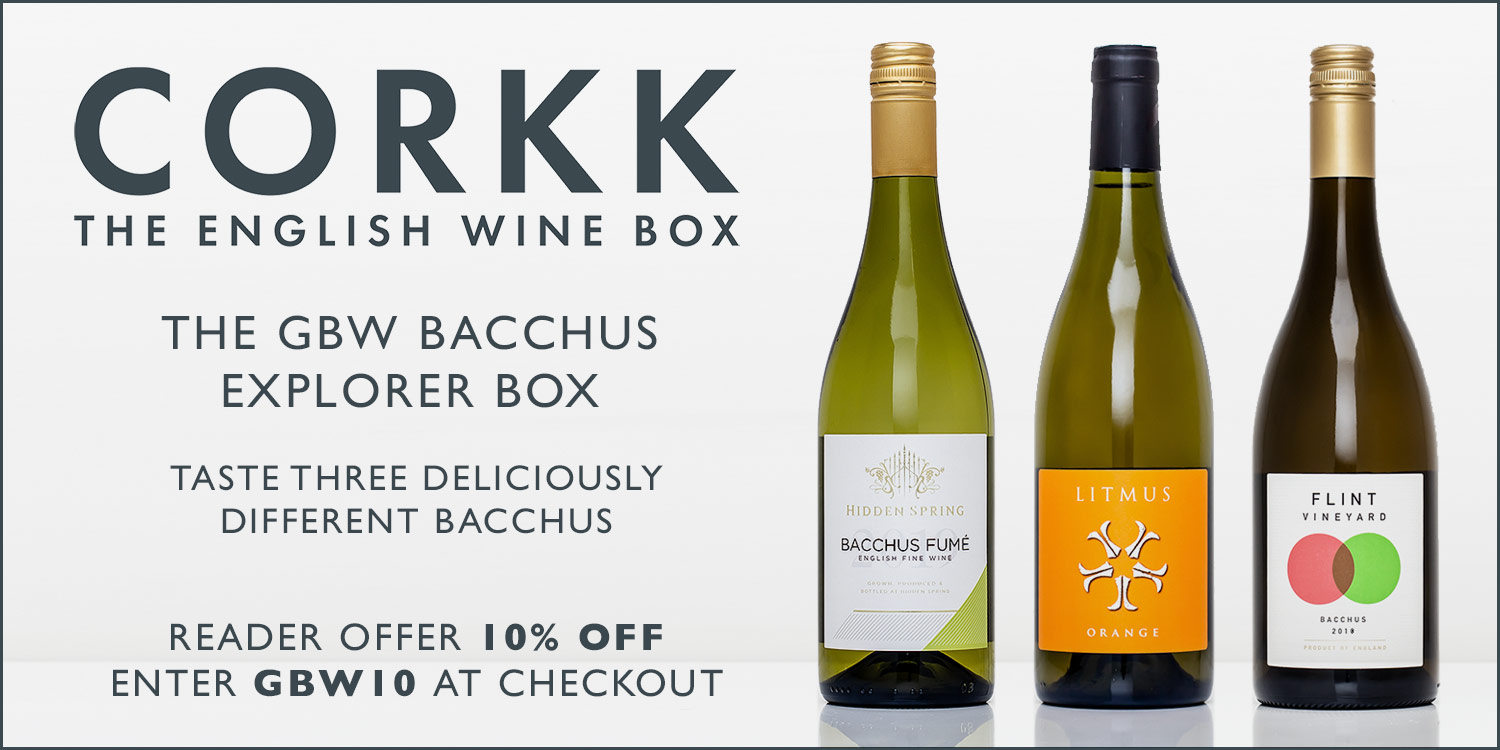
This month has been another busy one, both for me and the industry as a whole. With harvest well underway, and perhaps even complete at some vineyards across the country, it’s looking like 2020 will be another very promising vintage for English wine despite these very challenging times.
Following on from my recent enthusiasm for Bacchus, this month’s round-up covers our flagship still white grape exclusively. For the last couple of years, our Bacchus wines have been getting stronger and more diverse than ever. The 2018 vintage unsurprisingly turned out some fantastic wines, while some of the 2019 follow-ups are even better.
On the intricate and textural side, the benchmark has been, and continues to be, Chapel Down Kit’s Coty Bacchus (£25.00 – Chapel Down). The latest 2018 vintage is impeccably structured, exuberant and will certainly have potential to age. And talking of ageability, Poynings Grange Bacchus 2015 (£15.00 – Hawkins Bros) demonstrates how fascinating Bacchus can become with half a decade of bottle age. It’s also one of six brilliant Bacchus wines to have taken a Gold Medal at this year’s Independent English Wine Awards 2020. Litmus Orange Bacchus 2019 (£15.00 – Corkk) also provides one of the most complex, and likely divisive, expressions of Bacchus out there.
IEWA Gold Medal winners, Forty Hall Bacchus 2019 (£14.99 – Forty Hall) and Whitehall Bacchus 2019 (£14.99 – Whitehall) demonstrate two very different, but incredibly appealing young Bacchus expressions. Meanwhile, Norfolk superstars, Flint Vineyard, have delivered a Bacchus 2019 (to be released soon) that encapsulates a certain balance of complexity, freshness and structure that elevates it above previous strong vintages. And the first vintage of Kinsbrook Bacchus 2019 (£18.00 – Kinsbrook Vineyard), with its low abv of 10.6%, provides a lighter interpretation and features bold, distinctive branding.
The September round-up is completed by a really diverse trio, starting with the playful Chapel Down Bacchus Sparkling 2019 (£17.99 – Waitrose). Then we move on to a delicious oaked Hidden Spring Bacchus Fumé 2019 (£19.99 – Corkk) and the punchy, intense Sharpham Bacchus Stop Ferment (£13.49 – Grape Britannia).
Phew, what a lineup! Ten great examples of Bacchus, all certainly worthy of your time. So what are you waiting for, why not get out there and explore English Bacchus? If you do feel inclined to jump in then why not start with our Great British Wine Bacchus Explorer Box, in partnership with Corkk? Details can be found at the end of this article.
Chapel Down Kit’s Coty Bacchus 2018
• WINE OF THE MONTH •
Region: Kent
If there was a wine that demonstrated everything Bacchus was capable of, and then some more, it would be the Kit’s Coty. This third release is the first Kit’s wine from the exceptional 2018 vintage, and boy what a wine it is!
With a nose as exuberant and colourful as this, once again you would be hard-pressed to identify it as Bacchus if tasted blind. There are aromas of grilled pineapple, mint, cut grass, lime zest and pear. There’s a signature hint of oak in the background – which once again is deftly integrated.
I was worried that, coming from a vintage as warm as 2018, this Kit’s would lack some of the composure and balance the first two vintages had. I shouldn’t have questioned it, as this is every bit as controlled as in previous years, with its generous mix of ripe peach, tangy papaya tropics, and a seasoning of smoked nutty oak and mint.
Three vintages in, the Kit’s Coty Bacchus is on its way to becoming my favourite wine from Chapel Down’s flagship vineyard. And that’s saying something, alongside such exquisite icons as the Kit’s Chardonnay, Blanc de Blancs and Coeur de Cuvée.
Litmus Orange Bacchus 2019
Region: Surrey
Where to start with this wine – it’s a real mind-bender, a true ‘Marmite’ wine that some will love and others will hate. And it so it should be, being a maverick Orange Bacchus that was fermented on skins for 16 weeks.
The nose already gives you a suggestion of what you are going to experience with aromas of dandelion, fennel seed, dried tropical fruit, banana peel and spiced citrus peel. Does that sound like any other English wine?
The taste is similarly polarising, yet, for me, strangely alluring as one starts to appreciate its nuances. There is both an austerity, with the pithy, green, almost bitter notes, followed by a generosity of dried mango and over-ripe banana, and an almost creamy texture as it warms, with a tannic black tea finish. Props to John Worontschak and the Litmus team for being brave enough to produce this.
Poynings Grange Bacchus 2015
Region: Sussex
What happens to Bacchus as it ages? Rarely do we get a chance to try it outside of its lean, fresh, green intensity. However, this wine demonstrates that, given a chance, great Bacchus does age gracefully, shedding some of its lime and elderflower layers to reveal dried mango, smoky hints and a lightly oily palate.
Is this the underlying signature of Riesling parentage? It’s precisely that. Poynings Grange is a relatively young vineyard, planted in 2010 by Esme & Rupert Crowther in West Sussex. The nose of preserved citrus, tinned lychee and hedgerow is perhaps a nod towards Alsatian aromatics – something in between Pinot Gris, Gewürztraminer and, of course, Riesling.
And texturally it more than entertains as well. The acidity is still alive and zippy, while the mid-taste has a lush fusion of tropics, juicy peach, mango and floral tones. It’s slightly viscous, with more weight than you would expect for a Bacchus.
Forty Hall Organic Bacchus 2019
Region: London
This is a real gem – I love it when something unassuming, from a hugely meaningful project like Forty Hall, jumps out and performs at this level.
It begins with a nuanced, considered nose, packed with aromas of lime zest, cut grass and pear drops, with really distinctive mineral and herbaceous qualities.
The palate delivers on the promise of the nose – this Bacchus is anything but one-dimensional! The acidity is almost spritzy, but never overwhelming, with grassy notes, tangy tropical fruit and an engaging grippiness. However, it’s the floral herbs and white pepper notes on the finish that really stand out and leave a lasting impression.
Whitehall Bacchus 2019
Region: Wiltshire
Another smart looking new English wine brand, Whitehall is a family run vineyard in Wiltshire which has shot to fame this year with their IEWA Gold Medal-winning Bacchus 2019.
The nose on this wasn’t as immediate as some of the other 2019s I’ve tasted recently, with slightly reserved aromas of lime zest, white peach and light tropical fruit notes.
The palate is bold and expressive, however, with generous, juicy peach and tropical flavours in addition to exuberant, vibrant freshness with notes of gooseberry. The structure is superb, and the energetic zestiness is sure to please lovers of New World whites.
Flint Bacchus 2019
Region: Norfolk
Norfolk-based Flint Vineyard, run by Ben and Hannah Witchell, continue to impress with their generous and textural still wines.
The nose is on the subtle side compared to the last few vintages of Flint Bacchus, but it’s nuanced and multi-faceted with aromas of toasted lime, pear drop, passion fruit and herbs.
This is a considered, textured Bacchus, with a clean, tangy front end and a more luscious, pear drop, citrus and tropical fusion on the mid-taste. With a slightly green bell pepper, nettle and rocket pepperiness on the finish, I found this a really well-made and nicely structured Bacchus.
Kinsbrook Bacchus 2019
Region: Sussex
This is the first vintage from the really smart looking Kinsbrook Vineyard in Pulborough, which is not much more than a stone’s throw from English wine royalty, Wiston and Nyetimber.
On the nose, there’s lots of elderflower, lemon zest, English hedgerow, grass and a light sprinkling of grilled tropical fruit.
The Kinsbrook has an immediacy of tight, taut acidity that provides a refreshing first impression, while the tangy green citrus and tropical fruit medley makes this refreshing and immediately gratifying. A lower ABV of 10.6% means this wine has a light presence.
Chapel Down Bacchus Sparkling 2019
Region: Kent
The polar opposite of their Kit’s Coty Bacchus, Chapel Down’s Sparkling Bacchus 2019 is as playful and easy-drinking as they get. It’s also a wine that feels better than its previous release. The fruit is sourced across three counties – Kent, Sussex and Essex – and the wine is carbonated with light bubbles.
Coming from a cooler vintage than the inaugural release, this has a freshness and almost steely quality that lends itself better to a light sparkling wine style than the generous, tropical inaugural vintage.
This sparkling Bacchus has aromas of nettle, lime zest, elderflower and grapefruit. The palate delivers pretty much exactly as the nose expresses. Not a wine to sit and think about – but that doesn’t mean that it should be overlooked. It’s one of the better interpretations of aromatic sparkling wine out there, and, as such, it’s dangerously drinkable.
Hidden Spring Bacchus Fumé 2019
Region: Sussex
When talking to Corkk English Wine Box founder, Jonathan Piggins, about ideas for a GBW Bacchus Explorer Box (see below for details), he was hugely excited about this WineGB Gold Medal winning Bacchus Fumé from Hidden Spring in East Sussex.
This wine was aged in oak barrels, which has produced a mixture of toasted spice, butterscotch and vanilla aromas, in addition to the fresh nettle, grapefruit, lime and floral hues of the young Bacchus.
The palate has a lovely, crisp fusion of zesty citrus, pungent tropical fruit, with welcoming roundness and richness to the mid-taste, and lightly spiced, grilled lime notes on the finish that make it a textural delight.
Sharpham Bacchus Stop Ferment 2019
Region: Devon
And we end on another truly different approach to England’s signature grape. Sharpham stop the fermentation on this Bacchus by cooling mid-ferment in order to retain natural sugars and lively, punchy acidity.
The nose is pungent and potent on this, with vibrant elderflower, lime zest, tropical fruits and cut grass aromas.
To taste, there is an attractive purity and intensity in the form of zingy citrus, tangy passion fruit and papaya, and a real sense of richness thanks to the residual sugar. But it never feels flabby, or even sweet, thanks to that brilliant, intense, dancing acidity. I didn’t expect to like this particularly, but it is, in fact, excellent.



